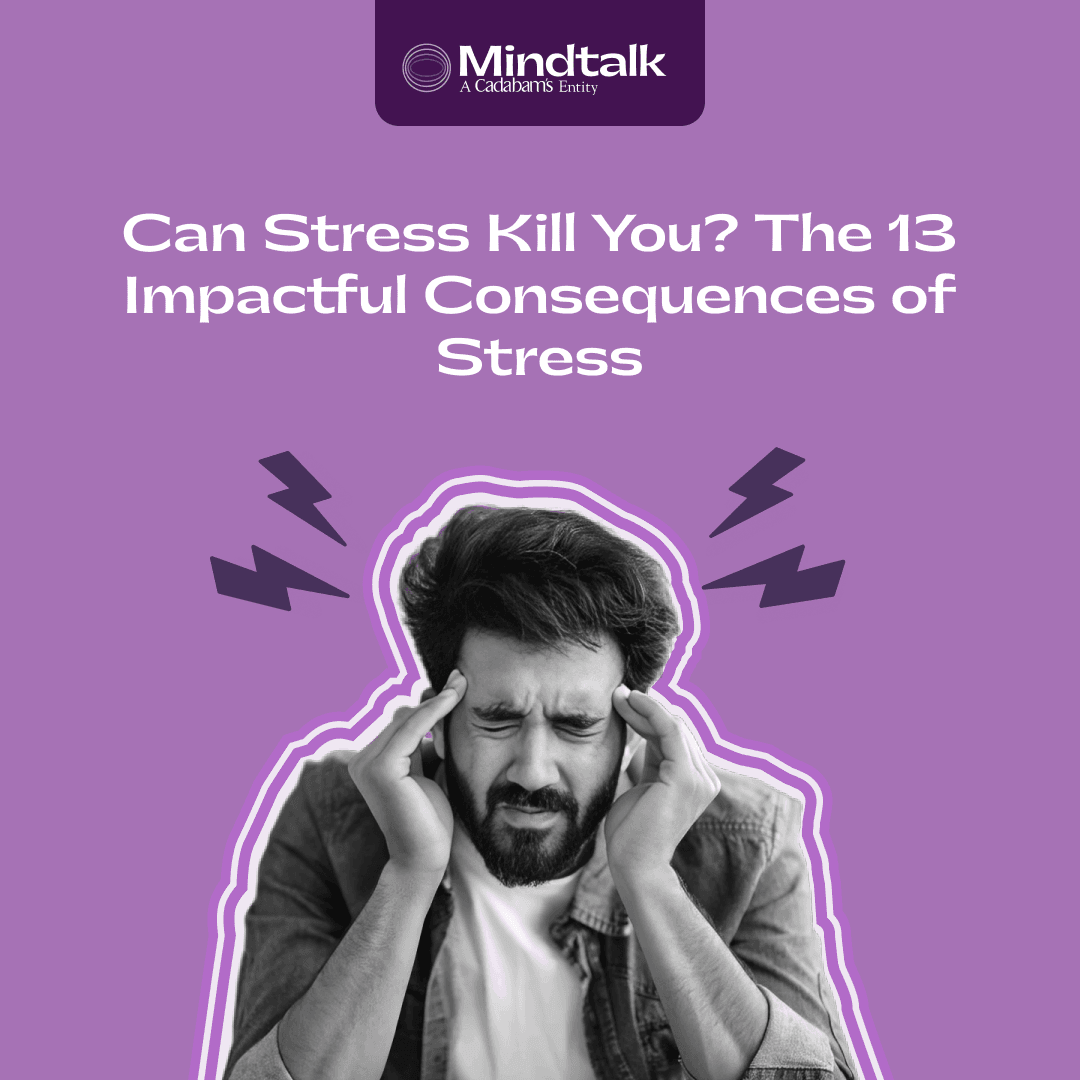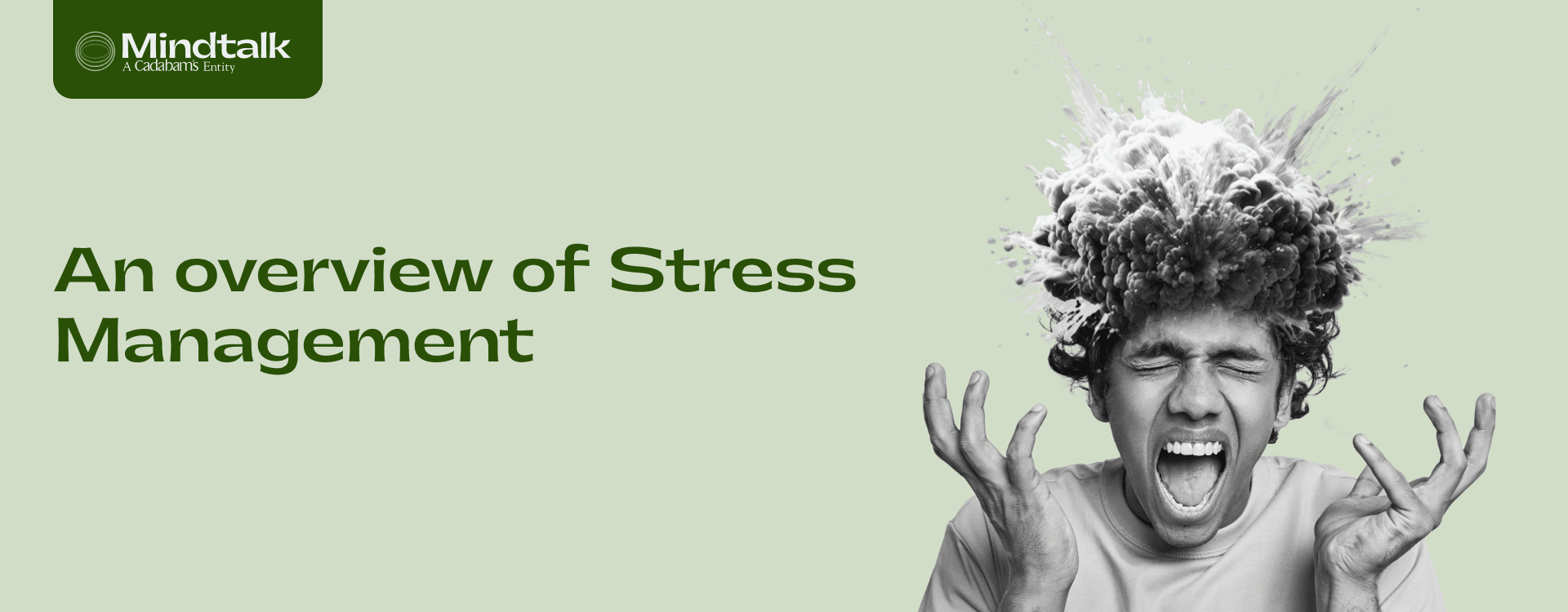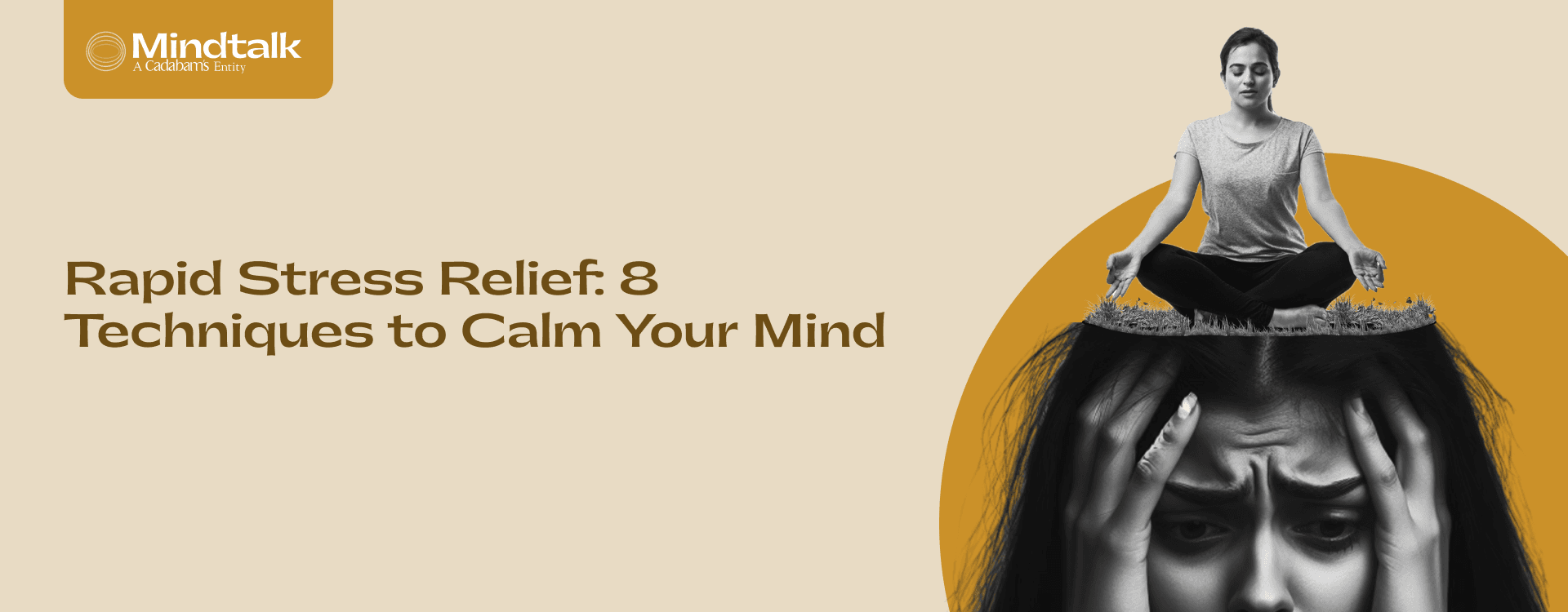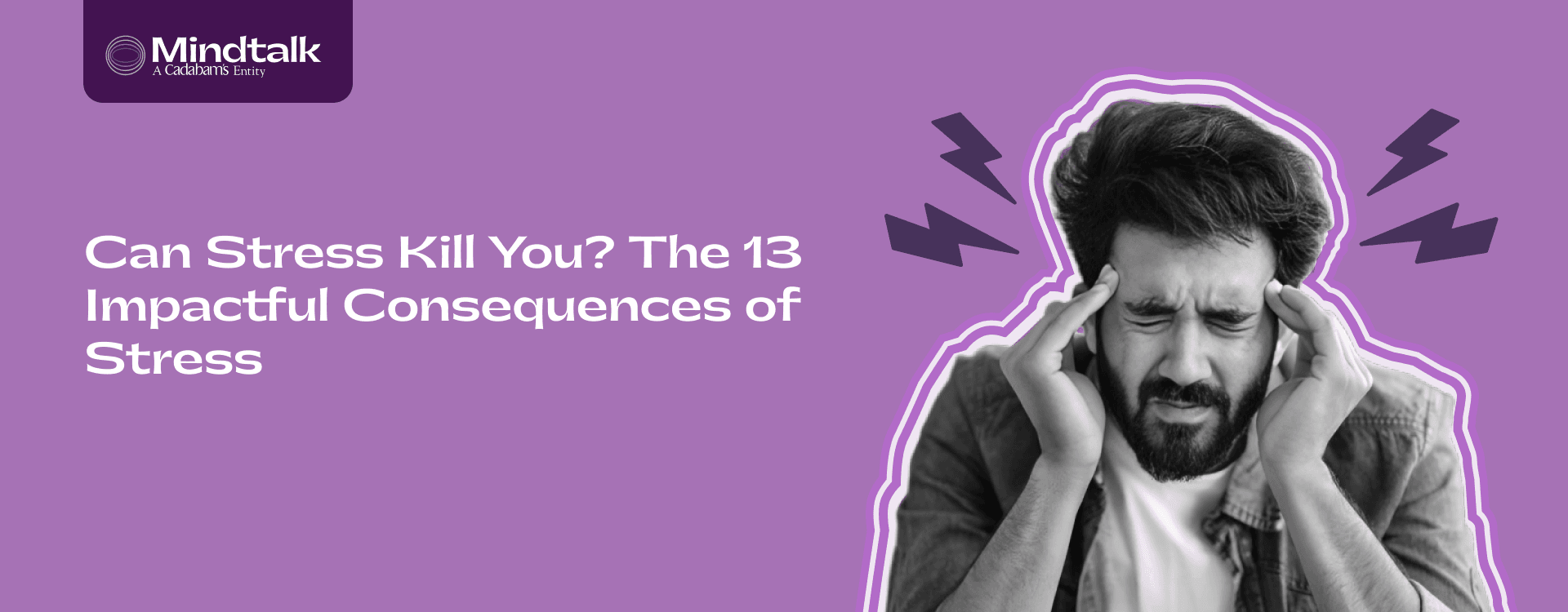How To Manage Death from Stress?

We're all familiar with stress—that knot in your stomach before a presentation, the racing heart during rush hour, the constant worry about bills piling up. But can this everyday pressure actually kill you? Unfortunately, the answer is yes. Imagine stress as a flame. Small anxieties are like flickers, easily managed. But chronic, unchecked stress becomes a raging inferno, engulfing your physical and mental health. This severe, prolonged stress can trigger a cascade of health problems, from high blood pressure and heart disease to weakened immunity and even suicide. It's a stark reminder that stress kills you.
Triggers are diverse; job burnout, financial burdens, relationship troubles, and even seemingly trivial daily hassles can all contribute. The key lies in how you handle them. Bottling up emotions, neglecting self-care, and resorting to unhealthy coping mechanisms like smoking or excessive alcohol can prove to be fatal. It's a harsh reality that stress kills.
Studies show a clear correlation: chronic stress significantly increases the risk of premature death from heart disease, stroke, and even some cancers. It's not just about pushing your body to its limits; stress disrupts your brain's ability to manage emotions and make healthy choices, fueling the cycle of stress and harm. The risk of death from stress is a serious concern.
But here's the good news—you're not powerless. Learning to manage stress is like learning to control the flame. By prioritizing self-care, practicing relaxation techniques like meditation or exercise, and seeking professional help when needed, you can turn down the heat and reclaim control of your health. Don't let stress become a silent killer. Take action today.
Can Stress Cause Death?
Severe stress can indeed have life-threatening consequences, impacting vital organs and immune function. The physiological toll, when acute stress becomes overwhelming, may contribute to cardiovascular events or weaken the body's ability to fight infections. Understanding the gravity of extreme stress is vital for overall health and well-being.
Factors That Cause Mortality Stress Reaction
Physical stressors can lead to real health issues, social pressures shape relationships, and psychological burdens delve into the depths of the mind. Understanding how these factors are interconnected is vital for grasping the seriousness of mortality stress and creating comprehensive approaches to lessen its impact on personal well-being.
Physical Stress
The body's fight-or-flight response, designed for short bursts of adrenaline, can become a chronic stressor, wearing down vital systems. Imagine tiny hammers relentlessly tapping on your heart, eroding its rhythm. This constant barrage weakens the arteries, raising blood pressure. Chronic stress also disrupts the immune system's delicate balance, leaving you vulnerable to infections and weakened defenses. Sleep, the body's repair shop, gets disrupted, further fueling the cycle of stress and damage. This wear and tear, often overlooked, can ultimately shorten a lifespan.
Psychosocial Stress
Psychosocial stress significantly contributes to mortality, according to recent studies. The impact extends beyond mental health, influencing physical well-being. Chronic stressors trigger physiological responses, including heightened cardiovascular strain and weakened immune function. This, in turn, creates a conducive environment for health conditions that can lead to premature death. The link between psychosocial stress and mortality underscores the importance of recognizing stress as a critical factor in overall health outcomes. As research advances, understanding and addressing this connection becomes essential for healthcare strategies aiming to improve longevity and well-being.
Psychological Stress
Psychological stress has emerged as a key contributor to mortality, findings from recent studies reveal. The impact of stress goes beyond mental well-being, affecting physical health and potentially leading to premature death. Prolonged exposure to stress triggers physiological responses, such as increased cardiovascular strain and a compromised immune system. These responses create an environment conducive to the development of health conditions that can be life-threatening. The connection between psychological stress and mortality highlights the critical need for acknowledging and addressing stress in healthcare strategies.
Different Signs Of Stress
Obsessive-Compulsive Disorder (OCD): OCD manifests as persistent, unwanted thoughts (obsessions) followed by repetitive behaviors or mental acts (compulsions) aimed at alleviating anxiety. Individuals may feel driven to perform these rituals, impacting their daily lives.
Post-Traumatic Stress Disorder (PTSD): PTSD results from exposure to traumatic events, causing intrusive memories, flashbacks, and nightmares. It often leads to heightened arousal, avoidance of reminders, and negative changes in mood and cognition.
Generalized Anxiety Disorder (GAD): GAD involves excessive worry and anxiety about various aspects of life, even when there is no apparent threat. Physical symptoms like restlessness, muscle tension, and difficulty concentrating are common in GAD.
These mental health conditions offer distinct glimpses into the diverse ways stress can manifest, impacting individuals' mental and emotional well-being. Understanding these signs is crucial for effective identification and treatment.
The 13 Impactful Consequences Of Stress
Stress involves a cascade of severe consequences for both physical and mental well-being. From cardiovascular issues, immune suppression, and mental health decline to digestive problems, sleep disturbances, and weight fluctuations, stress exacts a toll that spans from mild discomfort to debilitating conditions. Its impact extends to headaches, muscle tension, and skin disorders, while reproductive issues, cognitive decline, and substance abuse are not spared. Moreover, chronic stress accelerates aging, culminating in a spectrum of severity that underscores the urgent need for comprehensive stress management strategies.
Increased Anxiety
Increased anxiety emerges as a potent and prevalent consequence of stress, significantly impacting individuals across diverse demographics. The relentless pressures of daily life, compounded by stressors, trigger heightened levels of anxiety. This manifests in a range of symptoms, from restlessness and irritability to persistent worry and tension. Stress induces anxiety, which not only affects mental well-being but also leads to physical symptoms like headaches and digestive issues. The pervasive nature of this consequence underscores the need for widespread awareness and effective stress management strategies.
Sleep Disturbances
Stress takes a tangible toll on sleep, with disruptions ranging from difficulty falling asleep to frequent awakenings. The demands of daily life often lead to restless nights for many individuals. Insufficient and poor-quality sleep resulting from stress can manifest in daytime fatigue, impaired concentration, and irritability. Chronic stress further entrenches these sleep disturbances, creating a self-perpetuating cycle. Stress-related sleep issues encompass various forms, such as insomnia or disturbed sleep architecture. The physiological impact involves an overactive stress response, elevating cortisol levels and interfering with the natural sleep-wake cycle.
Digestive Issues
Stress-induced digestive problems can manifest as bloating, stomach cramps, and changes in bowel habits. The body’s stress response can lead to increased stomach acid production, contributing to heartburn and acid reflux. Chronic stress may also exacerbate conditions like irritable bowel syndrome (IBS). Furthermore, stress affects the gut microbiota, potentially leading to imbalances that influence digestion. These digestive issues highlight the intricate 0connection between stress and gastrointestinal health, underscoring the importance of implementing adequate stress management strategies.
Elevated Blood Pressure
When stress triggers the body’s “fight or flight” response, it prompts the release of stress hormones like cortisol. This hormonal surge prompts temporary increases in both heart rate and blood pressure. Chronic exposure to stress contributes to sustained elevated blood pressure levels, potentially leading to hypertension. Over time, this can strain the heart and arteries, increasing the risk of heart disease and other cardiovascular conditions.
Weakened Immune System
The body’s stress response triggers the release of adrenaline, which, when chronically elevated, suppresses immune function. This suppression hampers the body’s ability to fend off viruses, bacteria, and other pathogens effectively. Reduced production of white blood cells, impaired immune cell function, and diminished inflammatory responses are specific consequences of stress on the immune system.
Weight Fluctuations
Stress exerts a discernible impact on body weight, contributing to significant fluctuations for affected individuals. It involves various physiological and behavioral factors. When cortisol levels become elevated, it can lead to an increase in appetite and a preference for high-calorie comfort foods. Simultaneously, stress induced hormonal changes can contribute to the accumulation of abdominal fat. Conversely, some individuals may experience stress-related loss of appetite, ultimately resulting in weight loss.
Memory and Concentration Problems
Stress significantly hampers memory and concentration, creating tangible challenges for individuals navigating daily tasks. The cognitive toll of stress involves disruptions in the brain's ability to process information efficiently. Individuals under prolonged stress often experience difficulties recalling details, leading to lapses in short-term memory. Concentration problems manifest as an inability to stay focused on tasks, hindering productivity. Chronic stress can contribute to a persistent state of mental distraction, impacting the ability to concentrate on work or activities.
Mood Swings
Stress-induced mood swings manifest in various ways, including heightened emotional reactivity and difficulty regulating feelings. Individuals may find themselves more prone to outbursts or sudden shifts in temperament due to heightened stress responses. The impact extends beyond personal well-being, affecting professional interactions and social dynamics. Chronic stress not only intensifies the frequency of these mood swings but can also lead to prolonged emotional states, such as persistent irritability or an overwhelming sense of despondency. Cognitive functions may be compromised, making decision-making and problem-solving more challenging.
Decreased Sex Drive
Stress detrimentally impacts intimate relationships, causing a significant decrease in sexual drive for those grappling with persistent stressors. The psychological strain of stress induces hormonal shifts, including elevated cortisol levels, directly affecting reproductive and sexual functions. Physical manifestations of stress, such as chronic fatigue and muscle tension, contribute to a decline in sexual interest.
Skin Problems
Stress can trigger or exacerbate skin problems like eczema, psoriasis, and acne. The intricate relationship between stress and the skin involves the release of certain molecules that can worsen inflammation and disrupt the skin's natural balance. Individuals facing chronic stress may notice an increase in skin sensitivity, redness, or flare-ups of pre-existing conditions.
Hair Loss
Chronic stress can lead to a condition known as telogen effluvium, where stress disrupts the normal hair growth cycle, pushing more hair follicles into a resting phase. This results in noticeable hair shedding. Unlike normal hair, fall stress-induced hair loss is characterized by a sudden increase in shedding several months after a stressful event. Additionally, stress can contribute to trichotillomania, a compulsive hair-pulling disorder.
Muscle Tension
Stress-induced muscle tension arises from prolonged psychological strain, impacting the body physically. It manifests as tightness, stiffness, or discomfort, primarily in the neck, shoulders, and back. Recognizing it involves considering its association with stressors, often leading to persistent stress. Therapies offered by professionals include myofascial release, a technique targeting muscle and fascial tension, and biofeedback, helping individuals become aware of and control muscle tension. Stress management strategies like cognitive-behavioral therapy and relaxation techniques also aid in alleviating stress-induced muscle tension, offering comprehensive solutions.
Increased Risk of Chronic Diseases
Stress heightens the risk of chronic diseases by triggering persistent inflammatory responses and disrupting various physiological systems. Long-term exposure can lead to conditions like cardiovascular diseases, exacerbated by an increase in blood pressure and inflammation. it sets the stage for various diseases by promoting inflammation and disrupting bodily functions. Prolonged exposure to stressors can contribute to metabolic dysfunction, potentially leading to obesity and type 2 diabetes. Stress-induced hormonal changes may impact reproductive health, contributing to conditions like polycystic ovary syndrome (PCOS) in women. Digestive disorders such as irritable bowel syndrome (IBS) can also be exacerbated by chronic stress, affecting the gastrointestinal tract.
How To Stop Death From Stress?
Balanced Diet: A well-rounded diet with diverse nutrients supports the body's resilience against stress-induced damage. Nutrients like omega-3 fatty acids, found in fish and nuts, have anti-inflammatory properties, countering stress-related inflammation. Including complex carbohydrates from whole grains promotes stable blood sugar levels, aiding in mood regulation and stress management. Antioxidant-rich fruits and vegetables combat oxidative stress, mitigating cellular damage caused by chronic stressors.
Adequate sleep is a potent defense against stress-related mortality. During deep sleep, the body undergoes repair and restoration, enhancing overall resilience. Sleep promotes emotional regulation, reducing vulnerability to stressors. Sleep deprivation, on the other hand, heightens stress hormone levels, contributing to chronic stress.
Meditation exercises: meditation serves as a powerful stress mitigation tool impacting both body and mind. Mindfulness meditation, in particular, reduces the production of stress hormones and promotes a sense of calm. Integrating mindfulness into daily routines enhances emotional regulation and decreases physiological markers of stress. Mind-body practices like yoga offer a dual benefit, combining physical activity with meditative elements and fostering resilience against stress-related health risks.
Treatment Options For Stress
Exposure Therapy: In exposure Therapy, individuals gradually confront stressors in a controlled environment. This approach involves systematic, repeated encounters with anxiety-inducing stimuli, fostering desensitization. By facing fears directly, the mind learns to recalibrate its response, reducing the impact of stressors and diminishing their mortality implications over time.
Cognitive Behavioral Therapy (CBT): CBT delves into the intricate link between thoughts, feelings, and behaviors. By identifying and challenging negative thought patterns, individuals gain tools to reframe stress-inducing situations. This method shifts the focus from perceived threats to adaptive responses, creating a mental landscape that counters stress and its potential long-term consequences.
Acceptance Therapy: Acceptance Therapy, rooted in mindfulness principles, encourages acknowledging and embracing one's emotional experiences. This approach doesn't aim to eliminate stress but teaches individuals to coexist with it. By accepting stress as a part of life without judgment, individuals can reshape their relationship with it, reducing the physiological toll and mitigating associated mortality risks.
Overcome Mortality From Stress With Mindtalk
Escape the clutches of chronic stress with Mind talk's personalized therapy, a lifeline tailored by our expert therapists to combat your unique stress response. Beyond biofeedback, engage in cognitive behavioral therapy(CBT) to rewire thought patterns, acceptance and commitment therapy (ACT) to navigate challenges with mindfulness, and mindfulness meditation for inner peace. Mindtalk therapists aren't just coaches; they're partners offering active listening, accountability, and continuous learning. Don't let stress kill you or steal your future; invest in your well-being today. Connect with a Mindtalk therapist to rewrite your stress story.












